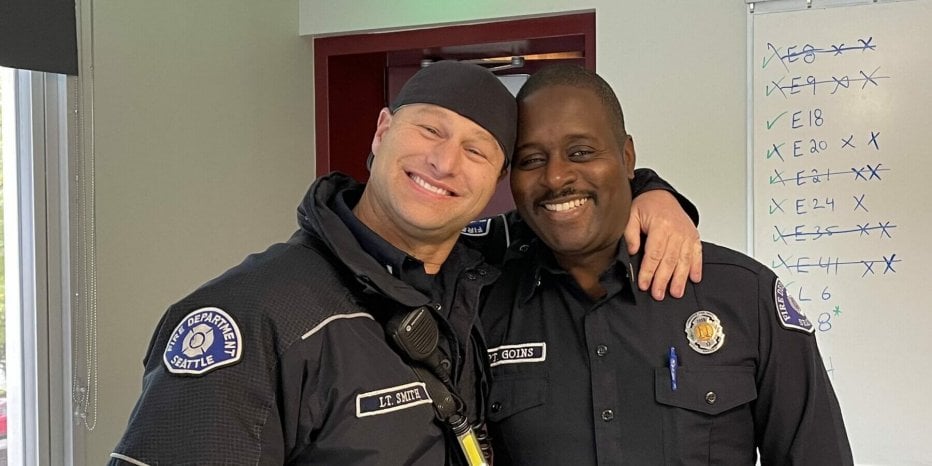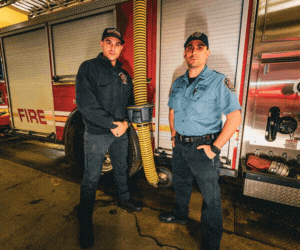We are the Fire Department

By: Hersch Wilson
It was 2:00 A.M. We were sound asleep. Then, “Reeeee!” the pager by my bedside toned out. “Hondo, Rollover. I-25 at mile marker 290. Semi.” Still half asleep, I got up, threw on my uniform, and left.
I volunteered with Hondo Fire and Rescue (part of Santa Fe County Fire Department in New Mexico). I was in that transition stage. I’d been with the department for five years, so I wasn’t brand new. I still wanted to go on every call, I was learning a lot, but I wasn’t considered a veteran. That title was for the firefighters with decades on our five-hundred calls-a-year service.
This call would be a turning point in my career.
Defining the word fire department
Fifteen minutes after the page, we were deep into solving the problem of cutting a driver out of a semi lying on its side. The driver’s hand was sticking out between the frame and the asphalt. We had a medic lying on her stomach, holding his hand, and talking to him. Her job was to keep us aware of any change in his condition. From what we could tell, he was entangled in his seat, the steering wheel, and the seatbelt.
Our chief assigned me operations. As our most senior rescue technician, he wanted to handle the extrication. I was responsible for “the big picture,” including landing the helicopter (Our SOP on long extrications), traffic, and time management.
It was slow going. The only practical access was to cut through the roof. This took time because trucks of that vintage were steel. I was worried about time and an injured driver. Finally, I walked up to Dan, our chief, and asked, “Is there someone we should call? To help?”
Dan looked at me and said, “Nope. We’re it. It’s just going to take us some time.”
“We could page city’s Heavy Rescue . . .” I mentioned.
Dan smiled. “Hersch, we are the Fire Department. We are Heavy Rescue. There is no one else to call. We got this. Trust me.”
We are the fire department.
My partner, Laurie, joined the fire department first. She was an EMT and wanted to keep her skills fresh. She cajoled me into joining a few months later. I joined because I thought it would be exciting and actually a stress reducer: great people and work that directly impacted our community.
We were proud to be in the department and probably did our share of “virtue signaling.”
Carrying the burden of the job
The weight of being a first responder had not descended on my shoulders. In those first few years, we had deaths and fires but none of the soul-sucking calls that would come later. The other reason was there was always someone who had the answers. There were always those firefighters and EMTs around who can find a BVM in the ambulance, or quickly get an engine into pump gear, and know exactly what to do and do it efficiently, with no wasted motions.
I felt safe with those men and women around: my mistakes and glitches would be covered and of no great consequence.
The Austrian poet Rilke captured it this way:
“So many live and want nothing, and are raised to the rank of prince by the slippery ease of their light judgments.”
My technical skills were growing. Yet the understanding that we were the ones who stood between life and death, chaos and order, wasn’t a thought, much less the deep belief that animated most veteran firefighters. Instead, I carried the magical view that if things got bad, there was always someone else we could call who would know what to do.
Most first responder’s “moment of truth” comes after a call with a bad outcome, where despite using all their training, someone dies, or a structure is fully engulfed and lost.
Answering the call
It’s the “wake-up” call. Our new understanding is that being a firefighter is not just about camaraderie and tradition, it is a life-defining vocation. The earth shifts a bit beneath our feet: we discover, often for the first time, that “stuff happens,” life is unpredictable, bad things happen to good people, and we are the ones that are often witnesses, caregivers, and redeemers in those moments.
In the fire service, we do not have the luxury of “light judgments.” We learn what we do has great consequences. For many, including myself, it is the transition to adulthood, to a deeper understanding of how the universe works and where we fit in the larger picture. It is not necessarily a pleasant transition, yet it is vital in the career of a first responder.
I was lucky. My “wake-up call” began with that simple sentence, “We are the fire department.” I took it to heart, and it made all the difference. I became a more serious student of being a first responder. The weight of the vocation will do that.
It took us about half an hour to get the driver out. He was unhurt. The extrication was interrupted when a drunk eighteen-year-old weaved through our roadblocks at high speed and t-boned a sheriff’s car protecting the helicopter. That driver was miraculously unhurt, and the vehicle was unoccupied. Had the sheriff not parked his car in front of the helicopter, the driver would’ve hit the ‘copter, and there would have been an explosion, and . . . well, it was a lesson in being paranoid on the interstate.
A final thought on being in the fire department
If they stick with the vocation long enough, every first responder will have their own “we are the fire department” moment. And that is a good thing. It leads to a deeper and richer appreciation of why we are here and the difference we make. So, if it hasn’t happened to you, embrace it and grow from it when it is your turn.
As always, be brave, be kind, and fight fires.
Hersch Wilson is a thirty-three-year veteran with the Hondo VFD in Santa Fe NM. He retired as an Assistant Chief. He also is the author of the award-winning “Firefighter Zen: A Field Guide to Thriving in Tough Times” available at local bookstores and online.
Photo by: Stephen Baer
Podcast
Contests & Promotions
















